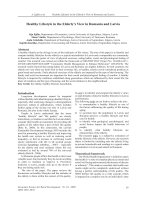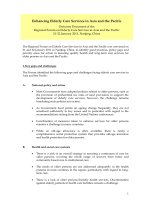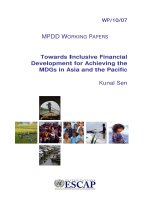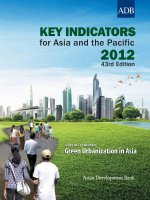Enhancing Elderly Care Services in Asia and the Pacific pptx
Bạn đang xem bản rút gọn của tài liệu. Xem và tải ngay bản đầy đủ của tài liệu tại đây (54.51 KB, 7 trang )
1
The Regional Forum on Elderly Care Services in Asia and the Pacific was convened on
21 and 22 January 2011 in Nanjing, China, to identify good practices, policy gaps and
priority areas for action in ensuring quality health and long-term care services for
older persons in Asia and the Pacific.
I. Key gaps and challenges
The Forum identified the following gaps and challenges facing elderly care services in
Asia and the Pacific:
A. National policy and action
Most Governments have adopted policies related to older persons, such as
the provision of preferential tax rates or land provisions to support the
development of elderly care services, however, the challenge remains
translating such policies into action.
As Government focal points on ageing change frequently, they are not
sensitized sufficiently to key issues and in particular with regard to the
recommendations arising from the United Nations conferences.
Coordination of measures taken to enhance services for older persons
remains a challenge in many countries.
While an old-age allowance is often available, there is rarely a
comprehensive social protection system that provides old-age insurance
and health protection for older persons.
B. Health and social care systems
There is a lack of an overall strategy in ensuring a continuum of care for
older persons, covering the whole range of services from home and
community-based care to institutional care.
The needs of older persons are not addressed adequately in the health
systems in most countries in the region, particularly with regard to long-
term care.
There is a lack of older persons-friendly health services. Discrimination
against elderly patients in health care facilities remains a challenge.
Enhancing Elderly Care Services in Asia and the Pacific
Outcome Document of
the
Regional Forum on Elderly Care Services in Asia and the Pacific
21-22 January 2011, Nanjing, China
2
Geriatric care is not well developed in most developing countries.
Geriatrics and gerontology are often not covered under the curriculum for
health care professionals. Furthermore, there is a need to look into
preventive care, acute care, treatment of chronic conditions, including
specialized diagnostic and therapeutic care for older persons.
There is a lack of coordination among organizations including government
agencies, academia and NGOs, in the provision and assessment of health
and social care services for older persons.
Access to health services is difficult for the “oldest old”, even if universal
health coverage is available due to lack of age-friendly transportation
services.
C. Human resource gaps in elderly care services
Elderly care services are very recent in several countries in the region and
many countries are unprepared for addressing upcoming challenges.
There is a severe shortage of caregivers, both informal and formal.
Specific training for caregivers for older persons is limited in many
countries.
Professional training for doctors, nurses and other health care personnel
does not include specific modules on care for the elderly. Existing training
often uses a medical approach only and there is not enough emphasis on
psycho-social needs or cultural factors. Moreover, training is often
hospital-based, and the support for community-based care is lacking.
There is also a need for specialized aged-care managers. Currently there
are MBAs trained in business administration, but less expertise in the
delivery of health care services. Tertiary institutions should offer more
opportunities for qualification in the field of gerontology.
There is currently a lack of regulations in terms of quality of training for
caregivers and quality care.
D. Social attitudes
Due to the negative image of ageing, older persons’ knowledge and
resourcefulness are often not recognized by younger generations.
Due to social attitudes against sending older persons to institutions,
families often have to shoulder the burden of caring for the elderly even if
they are unable to provide adequate care.
3
E. Knowledge gaps on ageing
There is a lack of standardized data collection on the situation and needs of
older persons.
There are significant knowledge gaps on self-care and healthy ageing
practices among older persons, particularly in poorer communities (for
example, how to delay the onset of illnesses).
F. Feminization of ageing
There is a high proportion of women among older persons, particularly
among the oldest old.
Older women often assume the role of informal caregivers and their own
social, economic and psychological needs can therefore be ignored.
Older persons may suffer from abuse and violence. Older women face
greater risks of abuse and violence due to discriminatory social attitudes,
religious beliefs (or the interpretations thereof) and some traditional
practices.
II. Recommendations
To address the gaps and challenges identified above, the Forum recommended the
following:
A. National policy and action
Governments should establish national policies on ageing where they are
not yet existing and review the policies regularly in conjunction with the
development of national development plans.
Governments should translate national policies into actions, through
establishment of a national coordinating body or mechanism on ageing,
clear definition of responsibility among key Government agencies, and a
strong monitoring and evaluation mechanism.
Governments should establish comprehensive social protection systems,
including providing universal income security at old age and universal
health/social insurance.
National political, social and religious leadership at the highest-level
should be engaged in advocacy on all issues related to ageing and older
persons.
4
B. Health and social care systems
Governments should develop or strengthen a strategy in providing a
comprehensive continuum of care for older persons, which emphasizes
home and community-based care, but also improves the coverage and
quality of institutional care.
Governments should develop regulations and minimum standards for
elderly care services and facilities at all levels, and develop or improve on
monitoring system for ensuring compliance to standards.
Laws and regulations should be put in place to strengthen legal protection,
with a view to eliminating all forms of discrimination, abuse and violence
against older persons, including ageism, in health care and other settings.
Health systems need to be adapted to address the rising demands for
medical services catering to the needs of older persons, both in acute care
and long-term care, and facilitate a continuum of care through
comprehensive mechanisms, including the use of IT to better link homes
and communities with health and social service providers.
C. Human resource development in elderly care
Governments should include strengthening caregiving service industry in
their national development plans and promote caregiving as an attractive
career opportunity.
Governments should allocate adequate budgetary resources for the
training of caregivers, in particular, to support training programmes for
informal caregivers in the elderly care service sector.
Governments should develop regulations and guidelines for training in
elderly care services and monitor the certification of training centers.
Geriatrics and gerontology should be included in the curriculum for
developing professionals in health and social care service sectors.
Community-based and non-profit organizations as well as the private
sector can play an important role in providing elderly care services and
training in cooperation with government agencies.
Intergovernmental and international organizations should provide support
for capacity building initiatives, particularly in addressing human resource
gaps.
D. Social attitudes
Governments and all agencies and organizations working in the area of
population ageing should collaborate and consolidate their efforts in
promoting a positive image of ageing and of older persons.
5
Media can play an important role in improving the image of older persons,
encouraging young people to think how they would live at old age and to
take care of older persons.
E. Knowledge gaps on ageing
Governments and the private sector should enhance investment in
research and development in products, services, medicines and technology
for older persons.
Governments should integrate knowledge on ageing into formal education
(including primary and secondary schools) curricula, non-formal
education programmes, and public information channels.
Governments and civil society organizations should work together to
promote and implement programmes (including via the media) to enhance
knowledge on self-care among older persons and health care providers.
F. Feminization of ageing
Governments should strengthen the development and implementation of
legal mechanisms to ensure that women’s rights are protected, including
addressing abuse of older women in all settings - at home, in community
and in institutions.
Governments should address religious and cultural norms in consultation
with their faith communities, taking into account the need for social
protection and gender justice.
Men should also be encouraged to become caregivers for the elderly in
addition to women.
G. Regional cooperation
An Asia-Pacific network on older persons should be established, to be
facilitated by ESCAP comprising national key stakeholders on ageing,
including Government focal points, NGOs, academia and international
organizations, with the aim of supporting the implementation and
monitoring of the Madrid International Plan of Action on Ageing.
Such a network could play an active role to promote the sharing of
experiences and good practices in enhancing elderly care, facilitate
research as well as capacity development activities. A priority area is the
adaptation of health systems to address the needs of older persons. It is
proposed that initial regional priorities for action should be identified by
members of the network. It is also proposed that an on-line regional
resource centre be developed to support the network’s activities.
6
III. Role of stakeholders
In order to address the above gaps and challenges, the Forum recommended that
Governments, civil society, the private sector and intergovernmental and international
organizations work closely together to enhance elderly care services.
With regard to the role of the various stakeholders, the Forum recommended the
following:
A. Role of Governments
Take a lead role in designing and implementing policies and programmes
towards the full realization of the rights of older persons.
Allocate adequate budgetary resources for the implementation of policies
and programmes on ageing.
Establish a system to regularly monitor and evaluate actions taken in the
implementation of MIPAA, including regular reviews on the situation of
the elderly, which will serve as a basis for developing policy initiatives.
Promote public and private partnership for service delivery, research and
development in medicines and technologies to meet the needs of older
persons.
Monitor and regulate elderly care service providers.
Enhance the capacity of local governments to ensure high quality elderly
care services.
Give special emphasis on rural, marginalized and indigenous older
persons, who may need specific care services.
Launch advocacy campaigns and strengthen public education to improve
the image of older persons and to encourage younger persons to care for
older persons.
B. Role of civil society including academia, the media and associations of older
persons
Participate in the development of national policies and programmes for
older persons.
Monitor the implementation of policies and programmes at national and
local levels.
Promote more evidence-based policies by providing adequate data to
Governments on the issue of ageing, and contribute to developing
standards and models of care.
7
Provide elderly care services and provide training in cooperation with
other entities.
Develop assistive and adaptive technologies to enhance older persons’
functional abilities and increase access to information and communication.
C. Role of the private sector
Develop quality products and appropriate technologies to fill the gaps in
meeting the needs of older persons, with support and regulation by
Government.
The private sector should be encouraged to include older persons in
Corporate Social Responsibility programmes and provide services for
older persons.
Further develop the IT capacity of people working in the elderly care
industry.
Actively consider providing elderly care services as a business opportunity.
D. Role of intergovernmental and international organizations
Promote regional cooperation in monitoring the implementation of the
Madrid International Plan of Action on Ageing and regular knowledge
sharing, including facilitation of exchange visits by professionals and civil
society organizations.
Support national capacity building initiatives in cooperation with national
Governments, including on disaster-preparedness training for older
persons.









